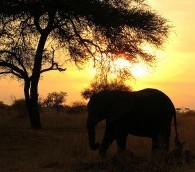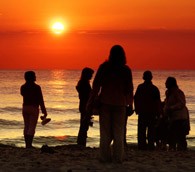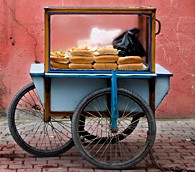Destination: Tanzania
A Reunion in Arusha
by Eva Holland | 03.12.12 | 8:13 AM ET
More than eight years ago we published Test Day, Frank Bures’ story about teaching English in Arusha, Tanzania, in the mid-‘90s. Now, the Washington Post has Frank’s thoughtful story about his long-awaited return to Arusha. Here he is exploring the town after more than 15 years away:
When I got downtown, I spent several hours wandering around. The lepers who used to beg by the river had been kicked up the road by trinket vendors. The library was still a sorry, run-down affair, filled with books on Dianetics and other irrelevant subjects. The “Modern Supermarket” had evolved into a liquor store. The Metropole Bar and Restaurant was now the “House of Burgers.” People, in general, had gotten fatter, and they had cellphones. Hotels were going up everywhere. The clock tower by the post office actually worked—and was sponsored by Coca-Cola. The Air Tanzania office was open, but the company’s two planes were broken.
From time to time, as I walked around, waves of memory and sadness washed over me. Where were all the people I knew? Arusha was a big town, but not that big. It felt as though I had been forsaken by an old friend. I hadn’t even lived in Arusha that long—just over a year. An Italian acquaintance had told me at the time: “A year is like a breath.” But it was a deep breath, and things were never quite the same after I exhaled.
In the story, Frank reunites with some of his former students, now adults and members of Tanzania’s growing middle class. “Test Day” has always been a favorite of mine in the World Hum archive, so it was a pleasure to read about their lives today.
David Brooks on Travel and the Haimish Line
by Jim Benning | 08.30.11 | 4:32 PM ET
The New York Times columnist recently took his family on safari to Kenya and Tanzania. They stayed in simple camps where they got to know people and more luxurious camps where they did not.
The more elegant camps felt colder. At one, each family had its own dinner table, so we didn’t get to know the other guests. The tents were spread farther apart. We also didn’t get to know the staff, who served us mostly as waiters, the way they would at a nice hotel.
I know only one word to describe what the simpler camps had and the more luxurious camps lacked: haimish. It’s a Yiddish word that suggests warmth, domesticity and unpretentious conviviality.
It occurred to me that when we moved from a simple camp to a more luxurious camp, we crossed an invisible Haimish Line. The simpler camps had it, the more comfortable ones did not.
Brooks goes on to extrapolate larger lessons about how we live. It’s a well-worn theme in travel—see Rick Steves and a thousand other sources. But the message never gets old, undoubtedly because most advertising continues to insist we’ll be happier if we just spend more money.
Will a Road Through the Serengeti Kill Tanzania’s Giant Tourism A.T.M.?
by Michael Yessis | 11.02.10 | 11:45 AM ET
Tanzania president Jakaya Kikwete wants to build a highway through the Serengeti, the location of the Great Migration, which, Jeffrey Gettleman writes, is “widely considered one of the most spectacular assemblies of animal life on the planet.” What will happen if the proposed road gets built?
Scientists and conservation groups paint a grim picture of what could happen next: rare animals like rhinos getting knocked down as roadkill; fences going up; invasive seeds sticking to car tires and being spread throughout the park; the migration getting blocked and the entire ecosystem becoming irreversibly damaged.
Tourism could also be a casualty.
Hundreds of thousands of people here depend on tourism for a living. And the Serengeti is like a giant A.T.M. for Tanzania, attracting more than 100,000 visitors each year, producing millions of dollars in park fees and helping drive Tanzania’s billion-dollar safari business, an economic pillar. “If anything bad happens to the Serengeti,” said Charles Ngereza, a Tanzanian tour operator, “we’re finished.”
Jeffrey Gettleman narrates an accompanying video.
World Travel Watch: Typhoid in Fiji, Khmer Rouge Tourism in Cambodia and More
by Larry Habegger | 03.10.10 | 10:41 AM ET
Larry Habegger rounds up global travel news
World Travel Watch: Elections in Sri Lanka, Shark Attack in Cape Town and More
by Larry Habegger | 01.20.10 | 12:59 PM ET
Larry Habegger rounds up global travel news
World Travel Watch: Safari Robbers in Tanzania, the ‘Real IRA’ in Belfast and More
by Larry Habegger | 12.09.09 | 9:33 PM ET
Larry Habegger rounds up global travel news
Safaris: Saviors of the Printed Word?
by Eva Holland | 08.04.09 | 1:07 PM ET
In the latest installment of Bookspotting, Book Bencher Vicky Raab spied Wired’s New York editor, Mark Horowitz, toting a stack of travel books—real ones, in hard copy!—in preparation for an African safari. What, no Kindle?
Raab writes: “Horowitz acknowledged that he was ‘totally Kindlized,’ but he was a bit worried about recharging, and none of the titles he had purchased are available as downloads. Still, he said that he may bring his along for the plane ride.”
Fair enough. The man does work for Wired, after all. His list of essential pre-safari titles is a good one, with everyone from Isak Dinesen and Peter Matthiessen to Stanley and Livingstone represented.
Stranger in Paradise
by Christopher Vourlias | 06.15.09 | 2:19 PM ET
Christopher Vourlias searches for a place to call home in Stone Town, Zanzibar
Shrinking Planet Headline of the Day: ‘Facebook Swahili Version Launched’
by Jim Benning | 06.15.09 | 2:15 PM ET
Facebook is now available in roughly 50 languages, and Swahili was the second African language to get its own version of the social networking site, the BBC reports.
Eight Great Family Travel Stories
by World Hum | 05.01.09 | 11:33 AM ET
To mark World Hum's eighth anniversary, we've collected eight favorite travel stories from our archives that explore the family vacation in all its forms
Eight Best Cities for Street Food
by Terry Ward | 12.15.08 | 12:16 AM ET
Terry Ward lifts the lid on a few of the world's tastiest places to eat the people's cuisine
Sesame Street, Global Edition
by Joanna Kakissis | 10.17.08 | 1:59 PM ET
When I heard Big Bird and South Africa’s muppet Zikwe talking to NPR about Putumayo Kids’ “Sesame Street Playground” album this weekend, I couldn’t help feeling jealous that I hadn’t grown up hearing songs like “Rubber Duckie” in Mandarin. The 40-year-old dean of all children’s shows now airs in 120 countries, and the new album showcases its worldwide reach.
There are songs from Israel, Palestine, Tanzania, South Africa, France, China, Russia, Mexico, the Netherlands, India and the United States. Concierge is especially fond of the “Pollution Song” from South Africa: a ditty about cleaning up after yourself. Wouldn’t it be nice if everyone in the world sang along to that?
Playing the ‘Mzungu Crazy Card’ in Zanzibar
by Eva Holland | 09.29.08 | 10:53 AM ET
In the Ottawa Citizen, Rebecca Hall muses about the “incredibly freeing” nature of being an outsider in Zanzibar. She writes:
I called it the Mzungu Crazy Card (mzungu is the Swahili term used to identify, varyingly, white people, foreign people, Europeans and magicians). As one of a handful of expatriates living on the Tanzanian archipelago, Zanzibar, everything I did incited laughter. Everything I did was “crazy,” and treated as such. I haggled for a mango in the market. I asked for tea without sugar at work. Crazy! I asked for tea with sugar at work. Still crazy.
Climbing Mt. Kilimanjaro: ‘Worse Than Childbirth’
by Eva Holland | 02.14.08 | 1:53 PM ET
That’s the verdict Gayle MacDonald comes to, after making the climb with 11 other middle-aged Canadian moms. Her recent story in the Globe and Mail, which is heavy on the ugly details, doesn’t exactly make me eager to try taking on Kilimanjaro myself, but it does make for a fun read about an unlikely group of people breaking from their routines and rising to a challenge. Here’s a sample:
‘Travels with Herodotus’: Kapuscinski and the Weight of History
by Frank Bures | 07.03.07 | 3:11 PM ET
Frank Bures considers Ryszard Kapuscinski's newly translated book -- and the Polish writer's controversial legacy
- « Prev Page
- Next Page »





